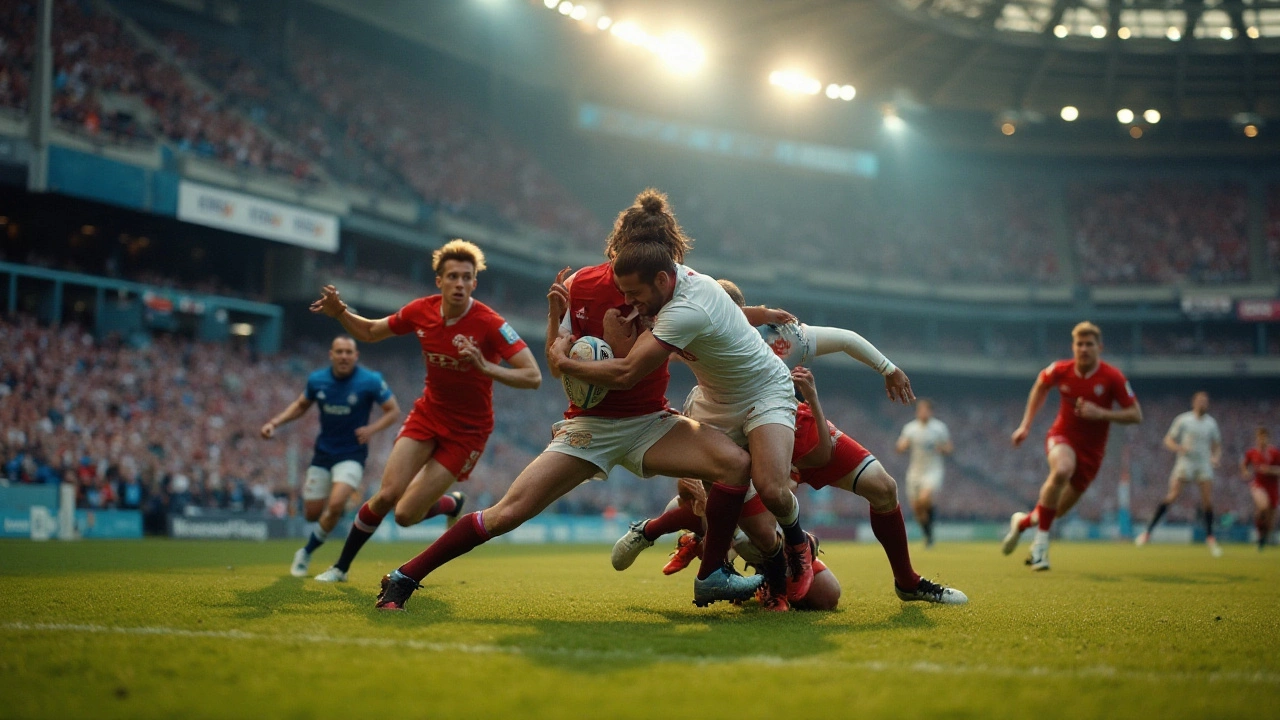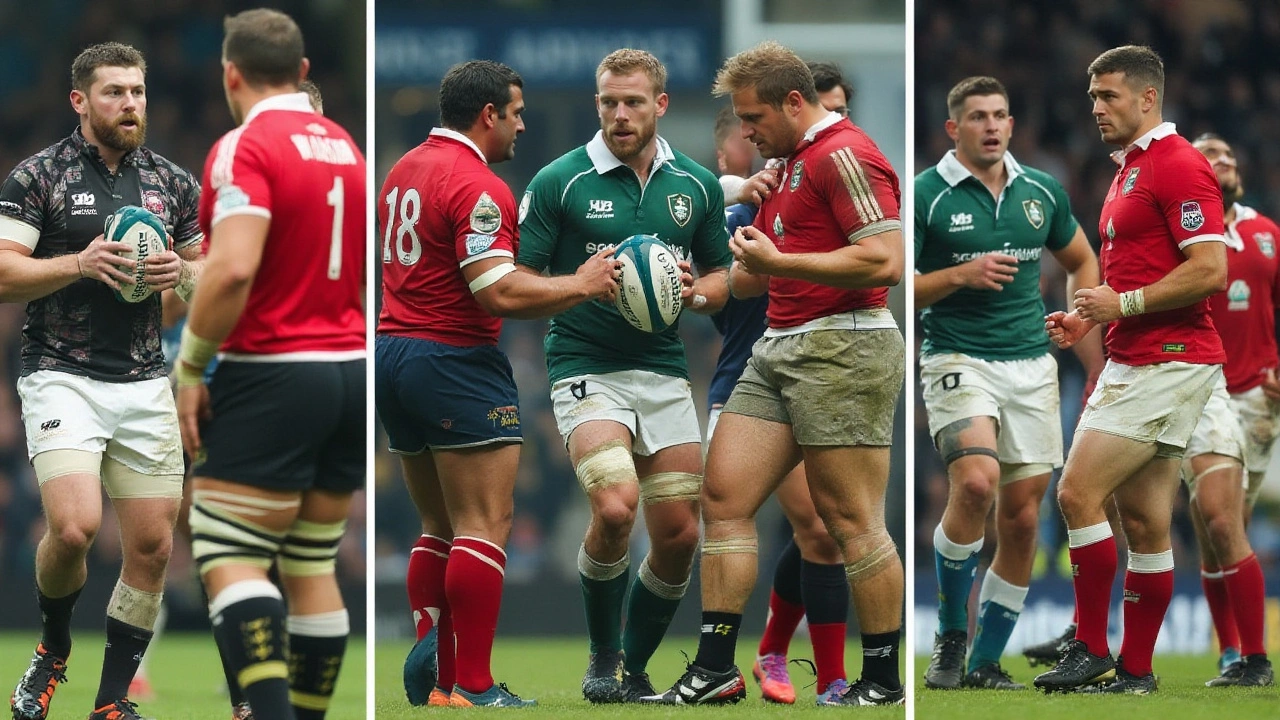Exploring Rugby Player Salaries: What Do They Earn?

Rugby, a game celebrated for its physicality and team spirit, also has an intriguing financial side. But what does it really mean to make a living off the sport? Understanding how rugby players get paid isn't just about looking at numbers. It's about considering the leagues they play in, the skills they bring, and even the countries they represent.
For those making their way into professional rugby, the journey can be vastly different depending on their path and geography. From sizeable contracts in renowned leagues to modest incomes in emerging markets, the financial spectrum is broad and fascinating. Through this lens, fans can better appreciate the commitment and resilience of rugby players worldwide.
- Factors Influencing Salaries
- Salaries in Top Leagues
- Comparison with Other Sports
- Impact on Players' Lives
Factors Influencing Salaries
The salary of a rugby player is determined by a complex mix of elements, some being more visible than others. At the forefront, the league where a player competes plays a significant role. Top leagues like the English Premier League Rugby and France's Top 14 boast larger financial resources, allowing them to offer higher salaries compared to smaller leagues. This disparity is often due to the lucrative broadcast deals, sponsorships, and a higher level of fan engagement these leagues enjoy. A player who has mastered the game and competes in these leagues likely earns a figure reflective of the commercial success and audience reach.
Beyond the league, a player's individual skill level is an undeniable factor. Players who consistently perform well, demonstrating exceptional talent and commitment, usually negotiate better contracts. For instance, well-known names like Beauden Barrett or Antoine Dupont can command significant salaries due to their proven track records and contribution to the sport. These players bring not only skill but also a certain marketability that attracts sponsors and garners fan support.
The international market also has its impact on salaries. Players from rugby powerhouses such as New Zealand and South Africa often witness higher earnings due to their nations' globally recognized rugby success. This recognition boosts a player's image, making them more attractive in both local and international leagues. A substantial offer from overseas clubs often temp players to ply their trade in foreign leagues.
"Rugby, at its core, although greatly about skill and teamwork, has transformed into a business. The players are very much a part of that business." - A quote from former Welsh rugby union player, Gareth Adams.
Besides these factors, age and experience play a subtle yet significant role in determining salaries. Younger talents may start with lower contracts but have the potential to negotiate substantial increases as they develop their careers. On the contrary, seasoned players, despite their experience, face downturns unless they maintain peak performance. Promising young talents are often offered lucrative deals by foresighted clubs who aim to secure their services long-term.
Lastly, health and injuries can directly affect a player's earnings. Rugby is physically demanding, and injuries are common. Contracts often have performance clauses or injury safeguards that can alter a player's salary. This makes health an indirect yet crucial financial factor. Clubs weigh these risks, and players are often incentivized for maintaining peak physical condition.

Salaries in Top Leagues
Rugby salaries in top leagues paint a fascinating picture of the sport’s dynamics and its very real economic influence. When you think of prestigious competitions like the English Premiership, the French Top 14, and the Super Rugby League, you think of intense competition and some seriously skilled athletes. Rugby's top leagues not only boast great games but also offer players substantial earnings. The English Premiership, for instance, is renowned for its robust financial health. Some star players here can command salaries upwards of £300,000 per year, reflecting both their value on the pitch and the commercial appeal they bring to their clubs. With clubs often competing for the best talents, it's no surprise to see transfers happening at eye-catching rates.
In France, the Top 14 league is another heavyweight in terms of player earnings. Due to a combination of lucrative TV deals and generous club owners, the French league can offer enticing contracts to some of the world's finest rugby stars. An average player here can earn around €240,000 annually, but the elite performers often see figures balloon to €700,000 or more. The financial standards are partly driven by the competition's history and its high viewership, further securing its place as a financial titan in the rugby world.
Crossing to the Southern Hemisphere, Super Rugby offers a slightly different salary structure, reflective of its international nature. Players competing in this league often have opportunities beyond the field, engaging with audiences across New Zealand, Australia, and South Africa. Although the salaries might vary depending on national regulations and team policies, some marquee players have reportedly earned around NZD 300,000 annually. This diversity of earnings within a single league highlights how rugby tries to harmonize local talent with international allure.
To add context, here's a quick look comparing regions within these leagues:
| League | Average Salary |
|---|---|
| English Premiership | £100,000 - £300,000 |
| French Top 14 | €240,000 - €700,000+ |
| Super Rugby | NZD 70,000 - 300,000 |
The financial side of rugby has often been a point of both critique and praise. Adjustments in salary caps and revenue sharing schemes are frequently discussed in union meetings worldwide, aiming to strike a balance between sustainable growth and competitive fairness. By looking at these leagues, we see not just the cost of maintaining rugby at its highest level, but also the income disparities that can exist between players in different regions.
In a sentiment shared by many within the sport, former England star Will Carling once remarked,
"Rugby isn't just a game of mingling bodies; it's an intricate dance of numbers and economics as well."His observation succinctly captures the essence of rugby's evolving financial landscape. The question of pay not only affects the sport’s stars but also shapes the opportunities for rising talent and even the strategies clubs employ as they grow their rosters.

Comparison with Other Sports
Rugby, with its rich history and global following, often draws comparisons to other major sports when it comes to player earnings. Yet, the pay structures in rugby differ significantly from those in sports like soccer or basketball. One factor influencing these disparities is the difference in commercial appeal. Soccer boasts a colossal fan base, resulting in lucrative broadcasting rights and sponsorship deals. These financial benefits translate directly to the players, some of whom are among the richest athletes globally. In contrast, while rugby enjoys substantial followings in regions like Europe and the Southern Hemisphere, it doesn't quite reach the universal appeal soccer has, impacting the salary landscape substantially.
In the world of basketball, the National Basketball Association (NBA) offers players not only high salaries but also significant endorsement opportunities. Basketball's fast-paced nature and widespread popularity make it a magnet for advertisers. Rugby's physical intensity and team-driven approach, while revered by fans, don't always command the same media attention. As a result, although top-tier rugby players in leagues such as the English Premiership and Super Rugby can earn impressive sums, these figures remain modest compared to star NBA athletes. A
recent sports analysis stated, "Rugby's global revenue stream remains steady, yet the gap with other sports remains largely due to limited market access."
American football presents another interesting comparison. The National Football League (NFL) offers astronomical contracts, with players often securing multi-million-dollar deals. This is attributed to the sport's massive popularity in the United States, coupled with efficient branding strategies. Rugby, similar in physical demand, doesn't benefit from a centralized, universally celebrated competition with comparable financial backing. However, international rugby events, such as the Rugby World Cup, showcase the sport's growing appeal, potentially setting the stage for enhanced commercial prospects and bigger salaries in the future. Rugby's dynamic evolution reflects its attempt to carve a niche in the sports realm dominated by financial giants.
An interesting statistic from the rugby salaries domain is that, on average, rugby players in England earn between £20,000 to £100,000 annually, with superstars in top teams surpassing this range significantly. In contrast, soccer players in the English Premier League individually average around £3 million annually. This stark difference underscores the distinct financial realities players face in various sports. Fans and aspiring athletes must often navigate these discrepancies when considering professional pathways. This leads to discussions about rugby's future and whether it could one day stand shoulder-to-shoulder with the financial titans of international sports. As rugby continues to develop and embrace new markets, only time will tell how players' paychecks might evolve.

Impact on Players' Lives
The life of a rugby player is marked by both the triumphs on the field and the challenges posed off it, making the subject of rugby salaries not just an economic discussion, but a deeply personal one. On the surface, the rewards of playing rugby can be immense—fame, camaraderie, and for some, substantial earnings. The financial benefit, however, varies widely, creating vastly different experiences for players across different leagues and countries. In the top leagues, players can secure handsome pay packets, which enable them to live comfortably and invest in their post-playing careers. These players often have access to the best medical support, which is crucial for handling the physical demands of the sport.
But it's not all straightforward. For many, particularly those in less prominent leagues, rugby player earnings are much more modest. Some players balance their sports careers with other jobs to make ends meet. This dual aspect of professional life can be both mentally and physically taxing, impacting their performance and longevity in the sport. The disparity in pay also means that while some players can focus entirely on rugby, others face uncertainty, leading to stress and potential financial instability. According to a report by the International Rugby Players, a significant number of players express concern over their future financial security, a subject that resonates with the general workforce emphasizing the need for financial planning.
"The financial side of rugby is a double-edged sword," said Jonny Wilkinson, a renowned former England fly-half. "While the top players are well-compensated, there's an entire spectrum of salaries that impact players very differently. It's crucial for the sport to address these disparities."
Moreover, the impact of these varying incomes on the personal lives of players can't be understated. Wealthier players have the advantage of focusing on skill development and team bonds without the anxiety of financial strain. They're able to invest in personal well-being, maintaining peak physical condition through nutrition and fitness regimens. On the contrary, those earning less may face challenges when accessing premium health support, possibly affecting recovery from injuries—a common risk in any rugby career. Consequently, the financial environment becomes a part of how each player's journey unfolds, potentially influencing the length and success of their sporting careers.




